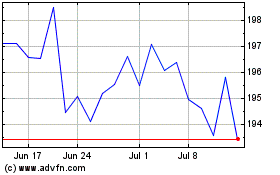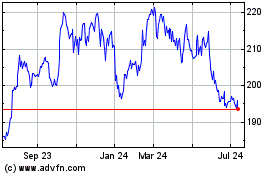Illinois House Panel Approves Pared Tax Deal For CME-CBOE, Sears
November 28 2011 - 5:30PM
Dow Jones News
Legislation providing tax breaks for Chicago's derivatives
exchanges and an Illinois-based retailer won the endorsement Monday
of a House committee.
However, comments during the committee hearing, including from
the Governor's budget director, suggest the bill is far from
winning final approval.
Leaders hope the measure becomes law by the end of this
week.
The Illinois House Revenue and Finance Committee sent the
legislation to the full House. It must also win favor with the
Senate and Democratic Governor Patrick Quinn.
The scaled-back version delays tax relief for CME Group Inc.
(CME), CBOE Holdings Inc. (CBOE), and Sears Holdings Corp. (SHLD)
until the start of the 2013 fiscal year, which starts July 1 of
next year.
CME, which claims it pays 6% of all the corporate taxes paid to
the Illinois government, initially sought to have its tax burden
reduced this fiscal year.
All three firms indicated they might move their headquarters to
other states. Chicago has been CME's home for 163 years.
In January, the legislature raised the corporate tax rate to 7%,
from 4.8%, costing CME an extra $50 million a year, according to
CME Chairman Terry Duffy.
The legislation allows CME and options exchange CBOE Holdings
Inc. (CBOE) to be taxed on 27.54% of all electronic trades, which
account for the vast majority of the business performed at the
exchanges. Currently, the exchanges pay taxes on 100% of their
electronic transactions.
The delay in implementing tax relief until the next fiscal year
represents "significant concessions" by the exchanges, committee
chairman John Bradley said on Sunday.
The extra time allows the fiscally troubled state to pay its
bills, said Bradley.
The watered-down package, which includes aid for small
businesses and workers, will cost the state approximately $200
million, down from the initial price tag of about $800 million to
$900 million.
Governor Patrick Quinn favored significantly larger allocations
in earned income tax credits to help low-income Illinois
workers.
Putting money in the hands of low-income workers stimulates
consumer demand and creates a "multiplier effect" for the economy,
Quinn's budget director David Vaught told the committee.
"The Governor supports the concept of the bill, but more work
needs to be done," said Vaught.
In its current form, the legislation gives the appearance that
it "only caters to special interests," Vaught also said.
A Republican on the committee, State Representative Ed Sullivan
Jr., argued that earned income tax credits don't create or retain
jobs, which he said was the initial goal of the legislation.
-By Howard Packowitz, Dow Jones Newswires; 312-750-4132;
howard.packowitz@dowjones.com
CME (NASDAQ:CME)
Historical Stock Chart
From May 2024 to Jun 2024

CME (NASDAQ:CME)
Historical Stock Chart
From Jun 2023 to Jun 2024
